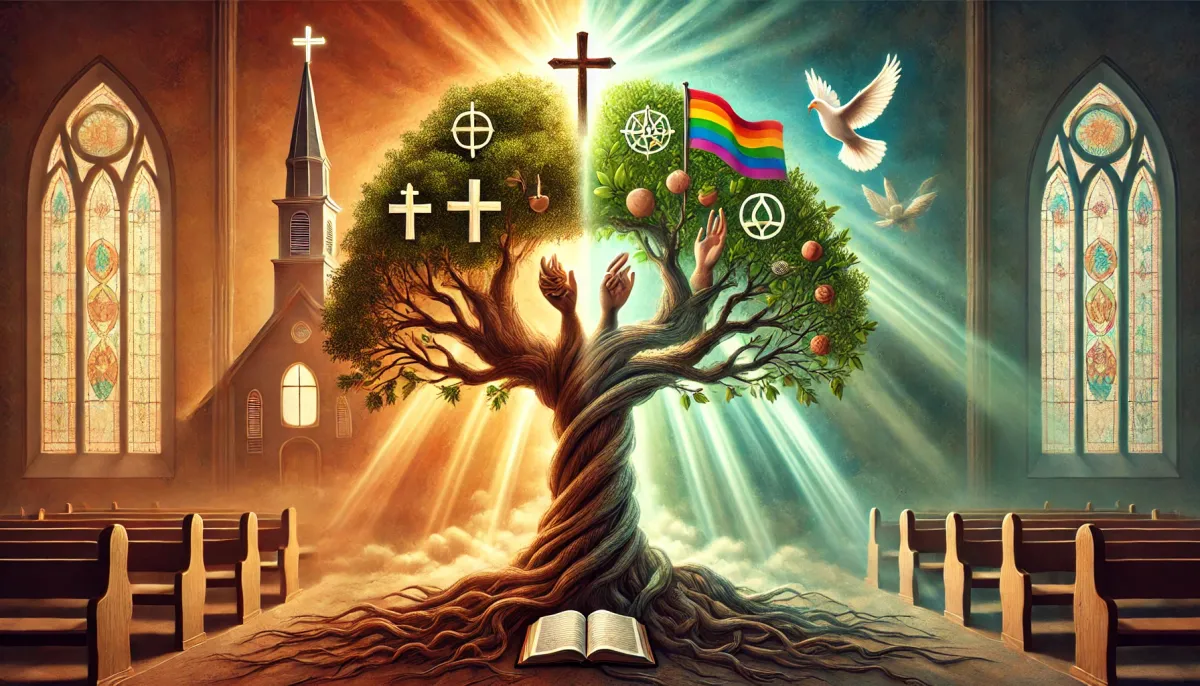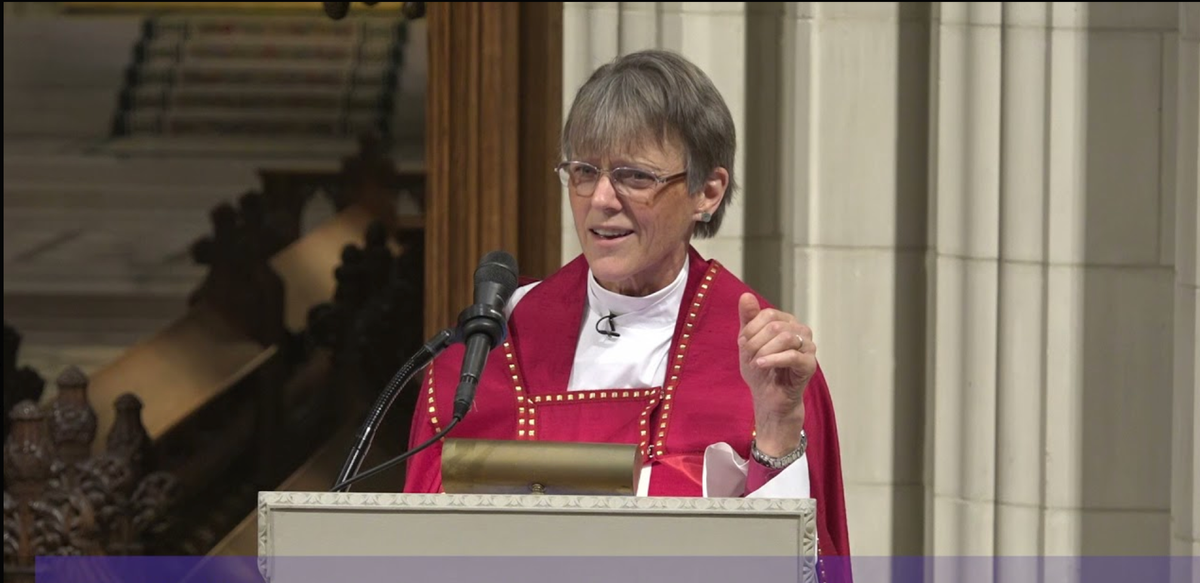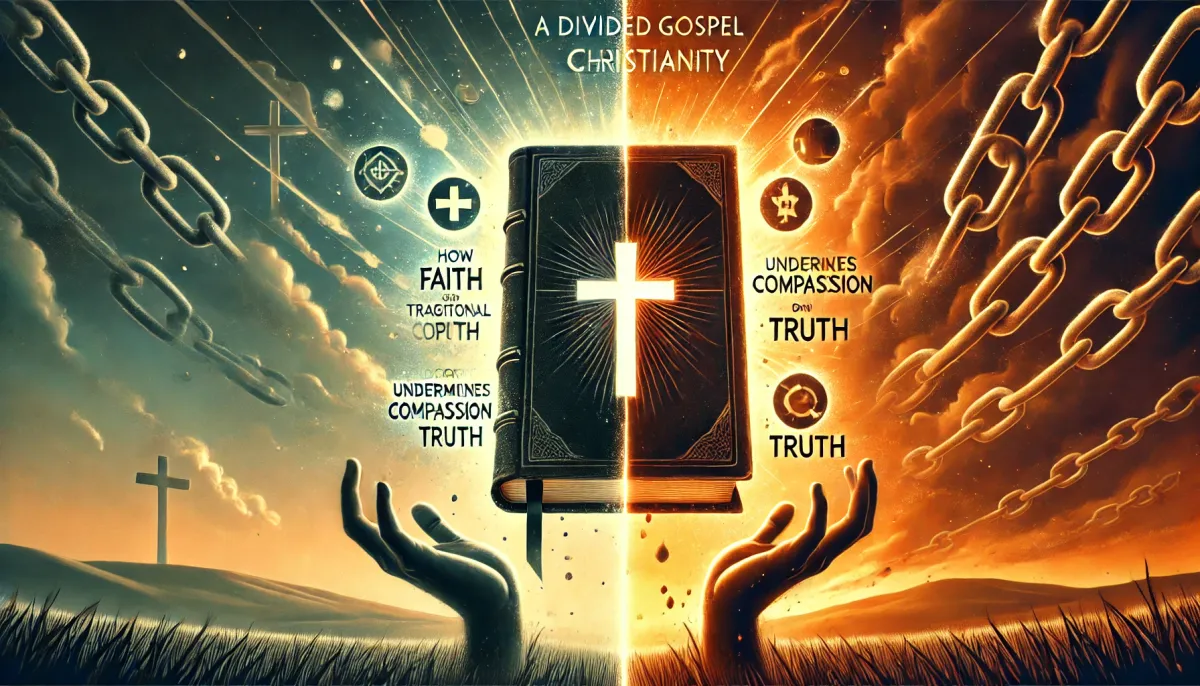

By Dr. Tim Orr
“Christian” has become increasingly ambiguous in today's polarized theological landscape. Evangelical and Progressive Christianity, though historically linked, now represent two vastly different faith systems. These differences go far beyond worship styles, denominational preferences, or political alignments—they represent a seismic divide in how God, scripture, salvation, and the church's role are understood. My friend Dr. George Yancey and Dr. Ashlee Quosigk’s book, One Faith No Longer (2021), masterfully demonstrates that these two camps have diverged so dramatically that they operate as distinct religions. To overlook this reality is to misunderstand not just theology but the trajectory of Christianity in modern culture.
This is not simply a question of internal disputes or denominational politics. It is a critical moment that forces us to ask: can two “faiths” that use the same terminology but hold irreconcilable worldviews genuinely coexist under the same banner? Or are we witnessing the splintering of Christianity into factions so distinct that they no longer share a common foundation?
Two Divergent Foundations: Authority and the Role of Scripture
The question of authority lies at the very core of the divide between evangelical and progressive Christianity. Evangelicals root their faith in the belief that scripture is God's inspired, inerrant, and authoritative word. This conviction is not negotiable, as evangelicals see the Bible as the definitive revelation of God’s character, will, and redemptive plan. It is the lens through which they view morality, culture, and their lives. When evangelicals encounter cultural pressures that conflict with scripture—be it related to sexuality, ethics, or social justice—they prioritize fidelity to God’s word over cultural trends. For them, 2 Timothy 3:16 is not just a verse but the guiding principle: “All Scripture is God-breathed and is useful for teaching, rebuking, correcting, and training in righteousness” (NIV).
Progressive Christianity, however, takes a far more fluid approach to scripture. For many progressives, the Bible is viewed as a historical document—a product of its time that reflects the biases and limitations of its human authors. While they may still see the Bible as a source of moral inspiration, they approach it critically, often prioritizing modern values such as inclusivity, equality, and social justice over traditional interpretations. For example, passages on sexuality (e.g., Romans 1:26-27) or exclusivity in salvation (e.g., John 14:6) are reinterpreted—or outright dismissed—as culturally conditioned statements with little relevance for today.
This fundamental difference leads to incompatible approaches to faith and practice. Evangelicals believe that the Bible should shape culture, whereas progressives believe culture should shape the interpretation of the Bible. For evangelicals, scripture is the immovable anchor; for progressives, it is a starting point, adaptable to modern sensibilities. The result is not merely a difference in emphasis but a complete shift in authority, with evangelicals relying on God’s unchanging word and progressives deferring to society's evolving ethos.
The Question of Salvation: Who Needs Saving, and Why?
Evangelicals and progressives differ sharply on salvation—arguably the heart of the Christian faith. Evangelicals are unwavering in their belief in the exclusivity of Christ. They affirm that Jesus’ sacrificial death and resurrection are the only means humanity can be reconciled to God. This belief, often called particularism, is central to the evangelical understanding of the gospel. In John 14:6, Jesus declares, “I am the way and the truth and the life. No one comes to the Father except through me.” Evangelicals take this claim literally and seriously, seeing it as the bedrock of their faith and the driving force behind their evangelistic efforts.
Progressive Christians, on the other hand, often reject the exclusivity of Christ in favor of universalism or pluralism. For progressives, salvation is less about eternal destiny and more about personal and societal transformation. Jesus is viewed as a moral teacher or a symbol of inclusion rather than the sole means of reconciliation with God. This perspective significantly diminishes the urgency of evangelism. If all roads lead to God or salvation is primarily about improving the human condition, the evangelical emphasis on repentance and faith in Christ becomes unnecessary or even offensive.
This divergence fundamentally reshapes how each group understands humanity’s greatest need. For evangelicals, the problem is sin—humanity’s rebellion against God—and the solution is redemption through Christ. For progressives, the problem is often framed in terms of systemic injustices, and the solution lies in activism and social reform. These are not merely different emphases; they are entirely different gospels, each offering a distinct vision of what it means to be “saved.”
Jesus: Savior or Social Activist?
Another stark difference between evangelical and progressive Christianity is their understanding of Jesus. For evangelicals, Jesus is the Son of God, the second person of the Trinity, and the Savior of the world. His divinity, atoning death, and bodily resurrection are central to evangelical theology. Evangelicals emphasize the importance of a personal relationship with Jesus, seeing him as a historical figure and a living Savior who transforms hearts and lives. This view fuels their worship, prayer, and mission as they seek to glorify Christ and proclaim his gospel.
Progressive Christians, however, often reimagine Jesus as a moral example or social activist. While they may still affirm his significance, they emphasize his role as an advocate for the marginalized and oppressed rather than his divinity or redemptive work. Sermons and writings in progressive circles frequently highlight Jesus’ teachings on love, inclusion, and justice while downplaying or rejecting doctrines like the virgin birth, substitutionary atonement, or the resurrection. This reinterpretation shifts the focus of faith from worshiping Jesus as Lord to following him as a moral guide.
The consequences of this shift are profound. For evangelicals, the church exists to proclaim the gospel, make disciples, and glorify God. For progressives, the church often becomes a platform for advancing social justice causes. While both groups might use the language of “following Jesus,” they follow very different versions of him—one as the divine Savior, the other as a moral revolutionary.
Two Different Approaches to Politics
Politics is another area where the divide between evangelicals and progressives becomes evident. Yancey and Quosigk’s research shows that evangelicals derive their political positions from scripture, allowing their theology to inform their engagement. For example, their pro-life stance is rooted in a biblical view of the sanctity of life, as seen in Psalm 139:13-16, which celebrates God’s intimate involvement in the formation of human life. Evangelicals believe their political actions must align with God’s revealed will, even if it means opposing cultural norms or political allies.
Progressive Christians, by contrast, often prioritize social justice values such as inclusion, equality, and environmental stewardship. While these values can align with biblical principles, progressives tend to derive them more from secular philosophies and political ideologies than from scripture. Their political engagement is often pragmatic, focused on coalition-building and achieving tangible outcomes. For instance, while some progressive Christians critique abortion, they rarely advocate for its legal restriction, choosing instead to maintain alliances with pro-choice activists. This dynamic reflects a broader tendency among progressives to let politics shape theology, whereas evangelicals see theology as the foundation for political action.
Two Different Social Boundaries
A key part of Yancey and Quosigk's analysis is how Progressives and Evangelicals define their social identity and establish boundaries for belonging. Progressive Christians prioritize cultural values and inclusivity, while conservative Christians emphasize theological orthodoxy and biblical authority (Yancey &Quosigk, 2021).
Yancey explains that progressive Christians construct their social identities around shared cultural and political values, such as inclusivity, social justice, environmental care, and advocacy for marginalized groups. These shared commitments often serve as the defining boundaries of their community rather than adherence to historic Christian doctrines or creeds. This approach allows progressive Christians to emphasize relational and ethical commitments over theological exclusivity, often downplaying doctrines like the uniqueness of Christ or the inerrancy of Scripture. In this context, faith becomes more about shared activism and cultural engagement than doctrinal agreement. This fluid approach to boundaries also facilitates collaboration with people of other faiths or no faith who share similar values, highlighting a pluralistic and experiential form of Christianity that prioritizes action over belief (Yancey &Quosigk, 2021).
In contrast, conservative Christians draw their boundaries around theology, emphasizing the authority of Scripture, doctrinal orthodoxy, and the exclusivity of Christ. For conservatives, these theological commitments are the non-negotiable foundation of their identity and play a central role in defining who belongs within their faith community. Yancey notes that this strict focus on theological boundaries creates a clearer distinction between who is "in" or "out" of the conservative Christian camp. Furthermore, conservative Christians view cultural engagement through the lens of evangelism and apologetics, prioritizing the preservation of biblical truth over accommodation to societal changes. This theological rigidity often puts conservatives at odds with broader cultural movements, as they see themselves as guardians of an unchanging faith in the face of what they perceive as moral and theological relativism (Yancey &Quosigk, 2021).
These contrasting approaches to identity and boundaries shape how each group engages with society and other religions. Progressive Christians, with their focus on inclusivity and shared values, are more likely to collaborate with secular or interfaith partners on social justice initiatives. Conservative Christians, on the other hand, prioritize evangelism and theological fidelity, often engaging with society in ways that reinforce their distinctiveness. Yancey highlights that these differing priorities not only reflect the growing divide between the two groups but also create distinct ways of being "Christian" in contemporary America.
Yancey’s analysis reveals a fundamental divergence in how progressive and conservative Christians define their faith. Progressives emphasize what Christianity does in the world—its ethical and social impact—while conservatives focus on what Christianity believes, prioritizing doctrinal purity and biblical truth. This divide underscores the broader transformation of American Christianity as these groups move further apart in their values, practices, and identities.
Why This Divide Does Not Fully Apply to Black Protestants
While the divide between evangelical and progressive Christianity dominates much of the conversation about the modern church, Black Protestants occupy a unique space that doesn’t neatly align with either side. Black Protestant traditions, such as the African Methodist Episcopal (AME) Church and the National Baptist Convention, are deeply rooted in theological conservatism, affirming the authority of scripture and the necessity of salvation through Christ. Yet, they also emphasize the communal dimensions of the gospel, which call for addressing systemic injustices like racial discrimination and economic inequality. For Black Protestants, faith is personal and social—an understanding forged in the crucible of historical oppression and shaped by the biblical call to seek justice. This holistic approach sets them apart, distinguishing them from the predominantly individualistic focus of white evangelicalism and the doctrinal fluidity often found in progressive Christianity.
Unlike progressive Christians, Black Protestants ground their commitment to social justice in scripture rather than secular ideologies. The Civil Rights Movement, led by clergy like Dr. Martin Luther King Jr., exemplifies how Black Protestants have historically seen their activism as an extension of biblical teaching. Passages such as Isaiah 58:6-7, which call believers to “loose the chains of injustice” and care for the oppressed, serve as the theological foundation for their work. This biblical framework allows Black Protestants to pursue justice without abandoning traditional Christian teachings. For example, many Black churches maintain conservative views on marriage, sexuality, and the sanctity of life, even while championing progressive causes like criminal justice reform and economic equity. Their social engagement is not a rejection of orthodoxy but a natural outworking of their faith, offering a model of how Christians can hold tightly to scripture while addressing the moral challenges of their time.
What makes Black Protestants truly unique is their ability to resist being completely influenced by either white evangelicals or progressive Christians. While their theological commitments align closely with evangelicals, many Black Protestants reject the cultural and political influence often associated with white evangelicalism, such as a lack of engagement with racial justice. Similarly, although their activism often overlaps with progressive causes, they reject the relativism and universalism that characterize much of progressive Christianity. This independence allows Black Protestants to offer a distinct, prophetic voice to American Christianity—one that challenges the broader church to embrace a gospel that transforms individual lives and societal structures. As Yancey and Quosigk (2021) observe, Black Protestants navigate a more complex theological and cultural identity, providing an essential reminder that the gospel is deeply personal and unflinchingly communal.
The Future of the Term “Christian”
The profound theological and cultural divide between evangelical and progressive Christianity raises an inevitable question: can both groups continue to share the label “Christian”? Yancey and Quosigk predict that progressive Christians will likely adopt a new label to distinguish themselves from evangelicals as the divide widens. This process has already begun in denominations like the United Methodist Church, where conservatives and progressives are forming separate bodies, such as the Global Methodist Church and Liberation Connection.
This separation is not just about branding but about theological identity. Evangelical Christianity, emphasizing scripture, salvation, and discipleship, is growing globally, particularly in Africa, Asia, and Latin America. Progressive Christianity, by contrast, is declining in membership and struggling to maintain relevance. Progressives' eventual adoption of a new identity would reflect the reality that they have moved beyond the evangelical tradition, embracing a faith system that prioritizes cultural alignment over biblical fidelity.
Conclusion: Two Faiths, One Word
The divide between evangelical and progressive Christianity is not a minor disagreement but a fundamental fracture. These two groups differ on the authority of scripture, the nature of salvation, the identity of Jesus, and the church's mission. They use the same terminology but mean entirely different things. As evangelicals, we must recognize this reality and stand firm on biblical truth, even as we engage with grace and love.
If evangelical Christianity is to remain faithful to its calling, it must reject the temptation to compromise with progressive theology. As Jude 1:3 urges, we must “contend for the faith that was once for all entrusted to God’s holy people.” Anything less is not Christianity—it is something else entirely.
References
Yancey, G., & Quosigk, A. (2021). One faith no longer: The transformation of Christianity in red and blue America. New York University Press.
Holy Bible, New International Version (NIV).
Tim Orr is a scholar of Islam, Evangelical minister, conference speaker, and interfaith consultant with over 30 years of experience in cross-cultural ministry. He holds six degrees, including a master’s in Islamic studies from the Islamic College in London. Tim taught Religious Studies for 15 years at Indiana University Columbus and is now a Congregations and Polarization Project research associate at the Center for the Study of Religion and American Culture at Indiana University Indianapolis. He has spoken at universities, including Oxford University, Imperial College London, the University of Tehran, Islamic College London, and mosques throughout the U.K. His research focuses on American Evangelicalism, Islamic antisemitism, and Islamic feminism, and he has published widely, including articles in Islamic peer-reviewed journals and three books.
Previous articles in this series have explored the key differences between Evangelical and Progressive Christianity.
 Dr. Tim Orr's BlogDr. Tim Orr
Dr. Tim Orr's BlogDr. Tim Orr
 Dr. Tim Orr's BlogDr. Tim Orr
Dr. Tim Orr's BlogDr. Tim Orr
 Dr. Tim Orr's BlogDr. Tim Orr
Dr. Tim Orr's BlogDr. Tim Orr
 Dr. Tim Orr's BlogDr. Tim Orr
Dr. Tim Orr's BlogDr. Tim Orr
